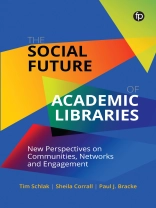The current focus in higher education on student engagement, holistic education, social responsibility and community partnerships demands a significant mind-shift for academic libraries to reclaim their place at the heart of academic institutions that are reinventing themselves as social enterprises. The professional response to social trends in the academy and society includes moves such as converged services, embedded librarians, relationship management, inside-out libraries and design thinking. But such work is often confined to small parts of the library and has not created the largescale change in strategy and culture required to turn libraries into dynamic social organisations in the connected digital world. Incremental enhancement of services, spaces and structures is not enough. The present context calls for radical rethinking of library mission and service philosophy to realign resources, processes and practices to institutional needs. New ways of working must be guided by new ways of thinking that empower librarians to view practices holistically through a social lens. Intellectual and social capital theories offer new perspectives on library work and a proven conceptual framework for the reset needed to keep academic libraries relevant in the 21st century.
The Social Future of Academic Libraries starts with the developments in thinking and practice that constitute the ‘social turn’ in communities, professions, the economy, the academy and libraries, while also introducing the core concepts of intellectual and social capital and networks. Part II presents nine case studies illustrating how social capital perspectives and social network theory can facilitate organisational learning, service development and collaborative relationships across different areas of library practice. Examples cover collection development, data services, information literacy, liaison librarians, library fundraising, service design, space utilisation, subject specialists and student success. The volume is accompanied by a keyword guide to the concepts, theories and models referenced in the text via two downloadable glossaries with related bibliographies to inform current reading and future work.
İçerik tablosu
Foreword: Capital, Value and the Becoming Library Stephen Town
Introduction: Charting a Course to the Social Future of Academic Libraries Tim Schlak
Part 1 Contexts and Concepts
1 The Social Turn in Communities, Professions and the Economy Sheila Corrall
2 Networks, Higher Education and the Social Future of Libraries Paul J. Bracke
3 Renewing and Revitalising the Social Mission of Higher Education Sheila Corrall
4 Social Capital and Academic Libraries: the Basics Tim Schlak
5 The Social Mission of Academic Libraries in Higher Education Sheila Corrall
6 Forecasting a Future for Academic Libraries: Engagement, Community Building and Organisational Development Tim Schlak
Part 2 Theory into Practice
7 Knowledge and Networks: Subject Specialists and the Social Library James Kessenides and Michael Brenes
8 Conceptualising the Sociocultural Nature of the Development of Information Literacy in Undergraduate Education Amanda L. Folk
9 Social Network Theory in Emerging Library Learning Spaces and Programs Alice Rogers, Sara Sweeney Bear and Scott Fralin
10 Advancing Research Data Management: A Social Capital Perspective on Functional Librarianship Andrea Kosavic and Minglu Wang
11 Relational Capital and Turnover in Liaison Roles in Academic Libraries Alice Kalinowski
12 Beyond Individual Relationships: Programmatic Approaches to Outreach and Engagement at UC Santa Barbara Library Rebecca L. Metzger
13 The Role of Academic Libraries in Developing Social Capital by Promoting Quality Reading in Local Communities Matthew Kelly
14 Social Capital in Academic Libraries: – A Model for Successful Fundraising Kathryn Dilworth
15 Design as an Accelerator of Social Capital in Academic Libraries Andrew Dillon
Conclusion: Into the Social Future Paul J. Bracke
Yazar hakkında
Paul J. Bracke is the Dean of the Foley Library and Associate Provost for Research and Interdisciplinary Initiatives at Gonzaga University. Prior to joining Gonzaga, he served inleadership roles at Purdue University and the University of Arizona. He holds a Master of Science in Library and Information Science degree from the University of Illinois and a Ph D in Higher Education from the University of Arizona. His research interests are in organisational development for academic libraries and community-based infrastructure to support digital scholarship. Sheila Corrall worked in public libraries and the British Library before moving into higher education where she directed library, information and technology services at three United Kingdom universities. In 2004 she became Professor of Librarianship and Information Management at the University of Sheffield and served as Head of the i School before moving in 2012 to the University of Pittsburgh as Chair of the Library and Information Science program. She retired in 2019, but continues to work on strategic issues for libraries, including data literacy, intellectual capital, open movements, professional development and reflective practice. Tim Schlak is the former Dean of the University Library at Robert Morris University, where he now works as Associate Provost for Academic Alliances. He holds a Ph D and Master’s in Library and Information Science as well as an MA in Russian Literature. His research interests range from social capital and leadership development to organisational theory.












